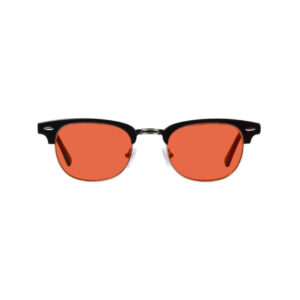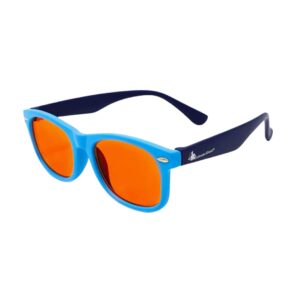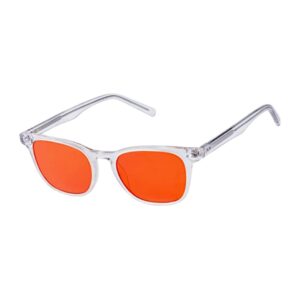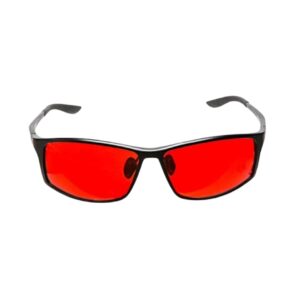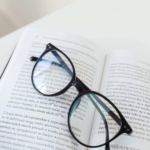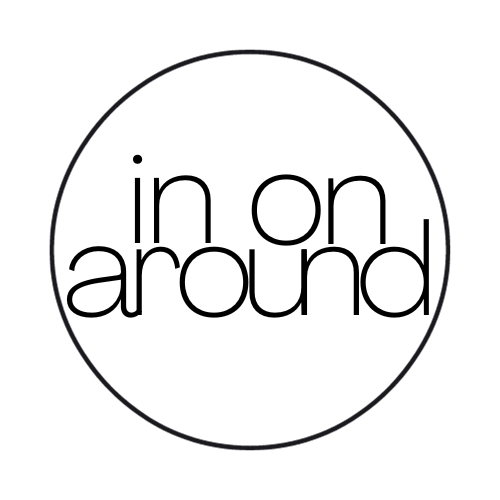Computers, phones, and TVs are regularly used in our day-to-day lives… but do you ever find yourself with a pounding headache after a long day of staring at screens? Please welcome: blue light-blocking glasses! These glasses supposedly block your eyes from irritating blue light wavelengths. So, do they actually do what they claim to? What are some blue light glasses benefits?
Keep reading to learn more about these special glasses and whether you should wear them on screen-heavy days.
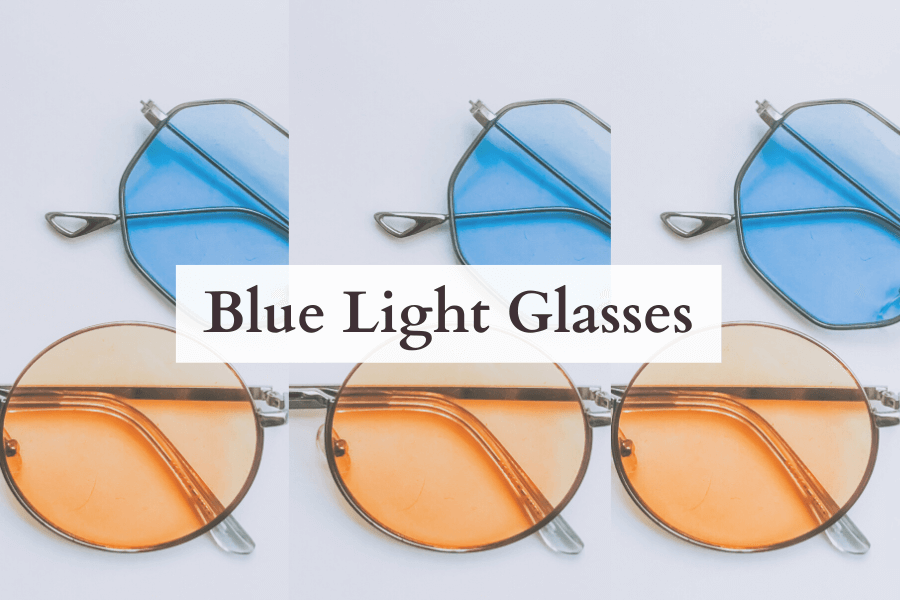
Note: This article contains affiliate links, meaning In On Around will make a small commission at no additional cost to you. This helps me maintain the site. As always, I value full transparency & only work with brands I love and trust.
What Is Blue Light?
We only see a certain spectrum of light called visible light. Remember the acronym “ROYGBIV” from high school?! Yeah, that’s all about the visible light or colors we can see in the electromagnetic spectrum.
Blue light is a specific wavelength of visible light. It’s short with high energy and ranges from 400-500 nanometers.
Since it’s a short spectrum of light, it’s stronger and has more energy than other wider wavelengths. These shorter wavelengths can penetrate to the back of the eye (… we’ll talk more about this later).
Blue light isn’t necessarily bad for you! Blue light, like from the sun, is essential for the regulation of our circadian rhythm (aka our sleep and wake cycle). When our eyes are exposed to blue light in the morning, it helps to tell our body that it’s time to wake up!
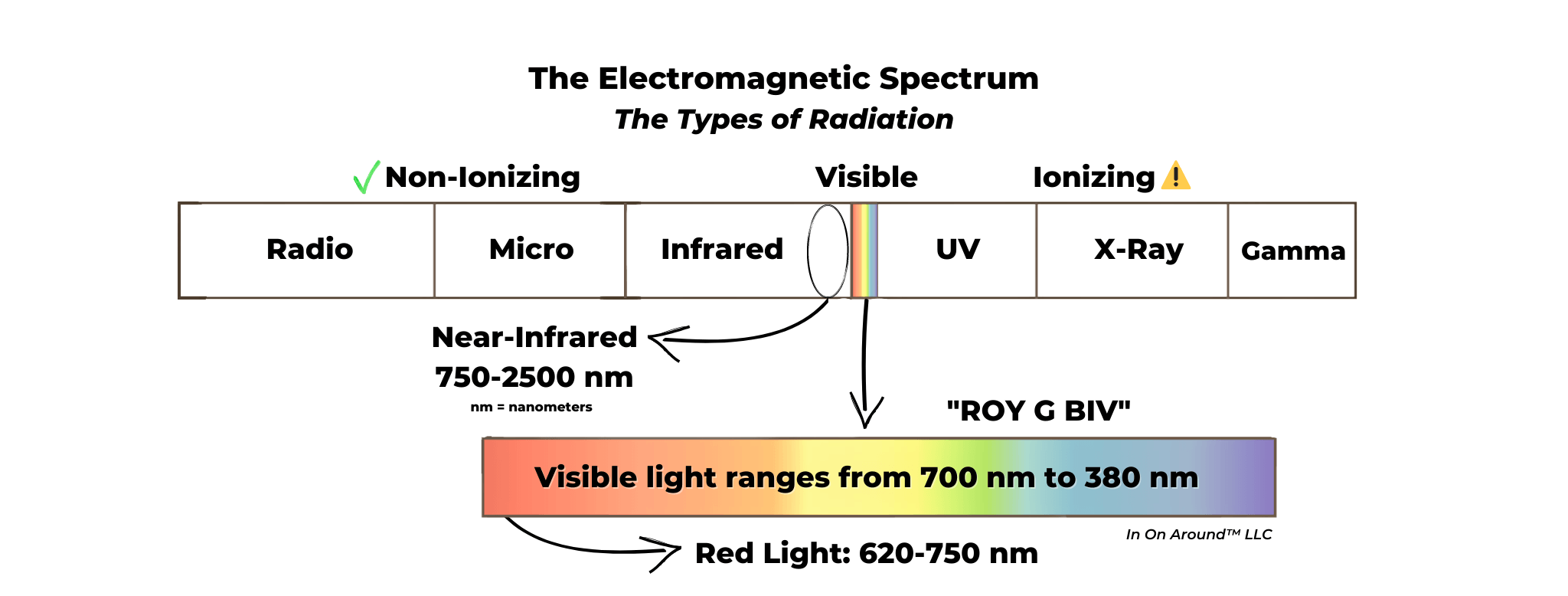
About 25% of the sun’s rays are blue wavelengths. [1]
How Are We Exposed To Blue Light?
We’re exposed to blue light in a number of different ways. Sunlight is a very natural source of this light, but screens and artificial lighting (fluorescent and LED) also release unnatural forms of blue light. Yes, this includes TVs, smartphones, computers, video games, alarm clocks, and more.
While some blue light exposure is necessary, modern-day humans are overexposed. Screens emit significantly less blue light than the sun, yet they can still impact your health, especially if you’re working in front of a screen all day every day. It’s a double whammy if you’re working under bright office overhead fluorescent lighting!
Notice how sunsets naturally have an orange-red tint? This is the Earth’s natural red light! There’s a reason why we’re not exposed to blue light at night. To learn more about red light devices, check out: Red Light Therapy At Home: Uses, Benefits, and Risks
On average, people spend about 7 hours looking at screens per day. GenZ averages over 9 hours per day. [2]
What Are Blue Light Glasses?
Blue light glasses can help to reduce your exposure to ocular blue light. These glasses have special coated tinted lenses that help reflect or filter out blue light. They’re also commonly called “computer glasses.” Many people use blue light glasses to prevent unnecessary eye strain.
Different Types Of Blue Light Glasses
It’s common to find two main type of blue light glasses: ones with clearer lenses and ones with orange/yellow lenses. Let’s dive into the differences:
– Clear Lenses
These lenses commonly look like normal glasses, just with a slight subtle tint of yellow. These are great glasses to use during work since it doesn’t look like you’re wearing blue light glasses! These usually filter at most 25-30% of blue light (usually they filter closer to 5%).
– Yellow/Orange/Red Lenses
Glasses with a yellow or orange tinted lenses are best for nighttime use. These lenses usually tint everything orange and can block out up to 99% of blue light. These are the most effective glasses and should be used. It’s best to opt for orange/red darker lenses.
Glasses Feedback
Before writing this article, I asked my Instagram community about their blue light glasses experiences and they said:
- “Love it! I use mine all the time!”
- “I don’t get migraines as much”
- “They help me get ready for bed. I love them!”
- “Definitely a believer.”
Not a single follower mentioned having a negative experience with these glasses, which is great! That’s a lot of praise for a simple pair of glasses. So how does blue light affect your health? Let’s dive into the potential health benefits of blue light-blocking glasses.
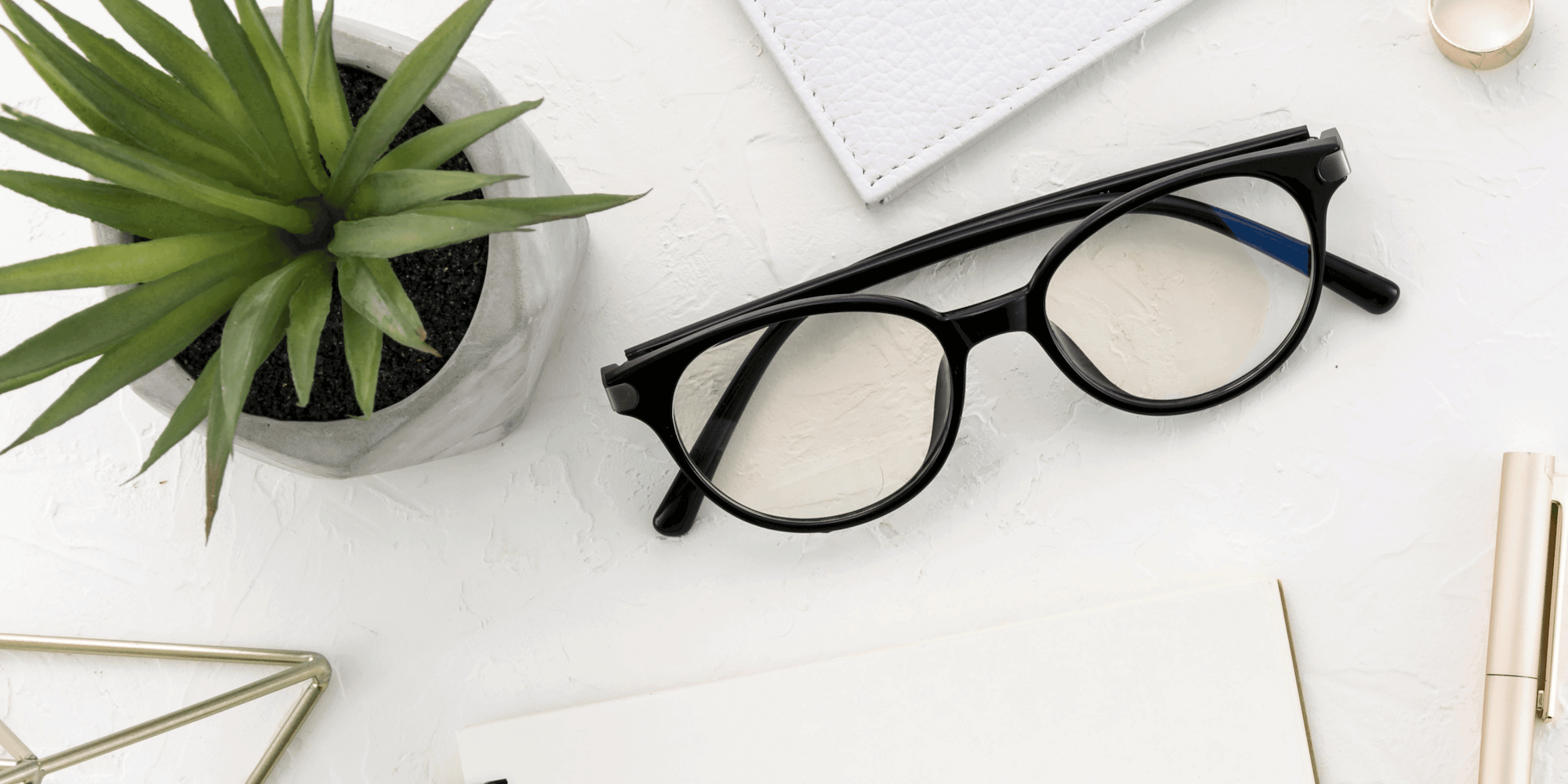
3 Health Benefits Of Blue Light Glasses
1 – Improved Sleep And Mood
Blue light impacts the release of melatonin in the body, which is an essential hormone that regulates our sleep. When you don’t have a good night’s rest or have persistent insomnia, it can lead to a host of physical and mental health issues. Depression, anxiety, cancer, obesity… you name it!
Here’s the catch though: scrolling on your phone or watching TV before bed can mess up our sleep and wake cycle. There’s a reason it’s called doomescrolling!
Without a doubt, blue light glasses can help promote healthy sleep. [3, 4, 5] Blue light can suppress melatonin for about twice as long as green light! [6] This means it could impact your sleep causing you to fall asleep in one hour instead of 30 minutes – yikes! Limited blue light exposure at night can improve your sleep.
To learn more about sleep tips, check out: Open When You Can’t Sleep! 18 Tips To Beat Insomnia
2 – Decreased Eye Strain
Blue light can lead to digital eye strain, also known as Computer Vision Syndrome (CVS). Our eyes are sensitive and blue light can irritate the light-sensitive tissue found at the back of our eyes.
Many people suffer from blurred vision, vision fatigue, itchy eyes, dry eyes, and eye strain. Our eyes aren’t built for the hours upon hours of looking at a screen.
Note: Research on this needs to catch up. There’s not a lot of research showing that blue light glasses cause a significant improvement in vision performance. [7, 8] Some people say it’s just a placebo, but I believe it’s because the blue light glasses dim any exceedingly bright lights.
About 60% of adults experience symptoms of digital eye strain. [9]
3 – Prevents Headaches And Migraines
Many people struggle with headaches or migraines from prolonged blue light exposure. If you’re staring at a computer or phone screen for hours upon hours, it’s no wonder why you get a headache!
Note: Some people claim that blue light exposure can damage the eyes and make them more sensitive to light, leading to macular degeneration and cataracts. The current evidence, however, does not support this claim. While a 2019 in vitro study showed that blue light damaged ocular surface cells, there’s not a lot of current evidence that shows blue light from screens can damage eyes, especially in humans. [10] The American Academy of Ophthalmology (AAO) believes there’s no link between blue light glasses and eye health. More research is needed in order to confirm that.
Can Blue Light Glasses Damage Your Eyes?
Blue light glasses will not usually damage your eyes, however, blue light contact lenses can, especially if they’re ill-manufactured. It’s best to opt for high-quality blue light glasses instead of lenses.
Can You Wear Blue Light Glasses All Day?
Yes, you can wear blue light glasses all day, however, it’s not always necessary. In fact, sometimes it’s counterintuitive. These glasses are most important to wear while you’re using or watching a screen – like from a computer, phone, or TV. You likely won’t need to wear them if you’re on a walk outside. In fact, getting natural indirect sun exposure at the beginning of the day helps with your circadian rhythm.
How To Mitigate The Effects Of Blue Light
Removing all screen time would be best, but that’s certainly impractical. Luckily, there are other things you can do to mitigate the harmful impacts of blue light, such as:
- Expose your eyes to natural sunlight in the morning
- This helps to calibrate your circadian rhythm so you know it’s time to start waking up.
- Just don’t look directly at the sun (… hopefully, that’s a no-brainer!)
- Take regular breaks from screens (phones, computers, TVs, etc…)
- Set a timer on your phone to hold yourself accountable.
- Try the 20-20-20 rule: every 20 minutes, look at something 20 feet away for at least 20 seconds.
- Limit your screentime before bed
- If you do use a screen, throw on high-quality blue light glasses that have an orange tint.
- Keeping your phone out of the bedroom can also help you get in the habit of unplugging for the night. The mindless scrolling in bed can have a bigger impact on your sleep than you might think!
- If you need to use a phone before bed, throw on some amber-tinted blue light blocking glasses and switch it to “night mode” or dim the screen- this makes the screen background darker.
- Regularly get your eye health checked by a qualified optometrist
- Keep in mind that a pair of glasses won’t always magically cure your headaches or migraines… but they may be able to help. Always look for the root cause.
- Keep your eyes lubricated with dry eye drops
- We have a tendency to reduce blinking when we’re scrolling on the computer or phone
- Sit an arm’s length away from your screen
- Eat a well-balanced organic diet with an assortment of fruits & vegetables for ocular health
About 70% of American adults don’t know blue light glasses exist for eye strain. [11]
What To Look For In Blue Light Glasses
When shopping for blue light blocking glasses, look for the following:
- Amber-tinted lenses (especially to wear at night)
- Anti-Ultraviolet (Anti-UV)
- Non-polarized (polarization can make it difficult to see screens)
- 3rd party tested for quality – usually manufacturers can provide a transmittance spectrum report to see what percent of blue light is blocked
- This is also known as official blue light spectrum report data
- This is performed using a visible spectrometer
- Finding these 3rd party test results can be challenging – sometimes you need to email and ask the manufacturer directly if it’s not on their website.
Quick At-Home Efficiency Tests
Most blue light glasses are not tested for efficacy, especially over time if lenses scratch or fade. The price also doesn’t necessarily guarantee blue-blocking effectiveness. These two quick at-home tests can get you an idea of how well your new blue light-blocking glasses work. No, these aren’t nearly as effective as an official 3rd party test, but they can give you a general idea.
Note: if you have prescription blue light glasses, these color tests won’t usually work.
Test One: When you have your blue light glasses on, look at an RGB color wheel. When you look at blue, it should look dark gray with the glasses on. The green section should also look darker.
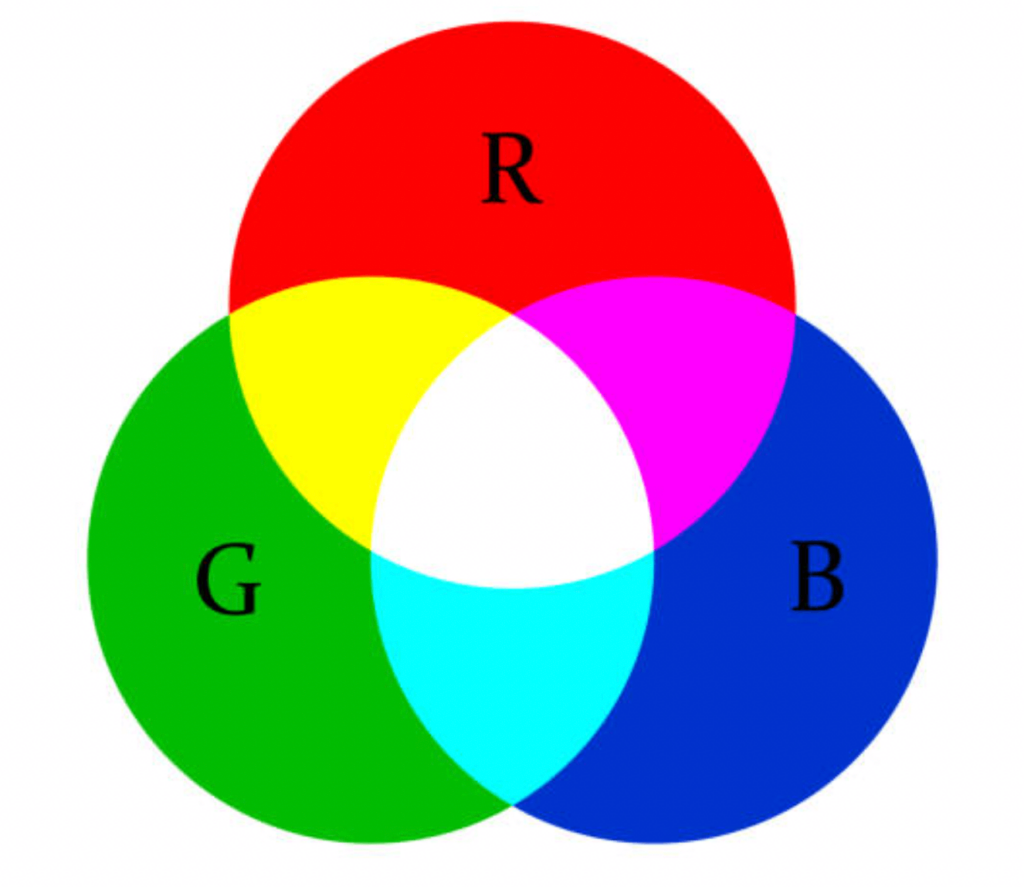
Test Two: Look at the below squares, both of which should be nearly black with blue light glasses on: [12]

Beware Of Blue Light Pens
Some companies will also provide you with a “blue light pen,” which is a mini blue light flashlight. They send this to the customer to try to prove that blue light doesn’t penetrate the lens. While this sounds promising, most of these pens are actually emitting violet light and therefore don’t work! Don’t fall for the scam. [13]
Beware Of FDA Approved
Many brands will also say they’re “FDA Approved” blue light glasses. This is usually false advertising! The Food & Drug Administration (FDA) does not regulate blue light-blocking glasses. They’re not classified as medical devices. Being registered and being approved by the FDA are two very different things.
The Best Blue Light Blocking Glasses
There are many great blue light blocking glasses on the market, but amber-tinted lenses work best. [14]
Here are some well-recommended brands:
- Bon Charge (discount code: inonaround)
- Ra Optics
- TrueDark (co-founded by Dave Asprey)
- DefenderShield (great kids option!)
- They offer a fun clip-on version as well
I have THL glasses, which are nice, but they certainly don’t remove all blue light. Better than nothing though!
You can typically buy blue light glasses at major glasses retailers, like Warby Parker, or online. Many companies also offer prescription blue light glasses if needed. These glasses are available in a number of different shapes to fit your preferences!
Note: I haven’t personally tried each of these brands, so can’t 100% attest to their quality – it’s always best to confirm with the manufacturer that they have a transmittance spectrum report or can prove how much blue light is removed. Usually, heavily amber-tinted glasses will work great.
Most blue light glasses cost between $15 to $50.
Final Thoughts – Blue Light Glasses Benefits
Avoiding all digital devices or overhead lights is simply not possible. Blue light-blocking glasses, however, can help reduce your risk of eye strain when on the computer or before bed. If you’re in front of a screen for a couple of hours a day, try these glasses out! There’s little to no harm in trying.
Do you absolutely NEED blue light glasses? No, absolutely not. But if you want to try, opt for amber-tinted glasses when you can. If you join the blue light-blocking glasses clan, snap a pic and tag @ InOnAround on Instagram!
⬇ Pin this “Do Blue Light Blocking Glasses Work?” pic on Pinterest for future reference! ⬇
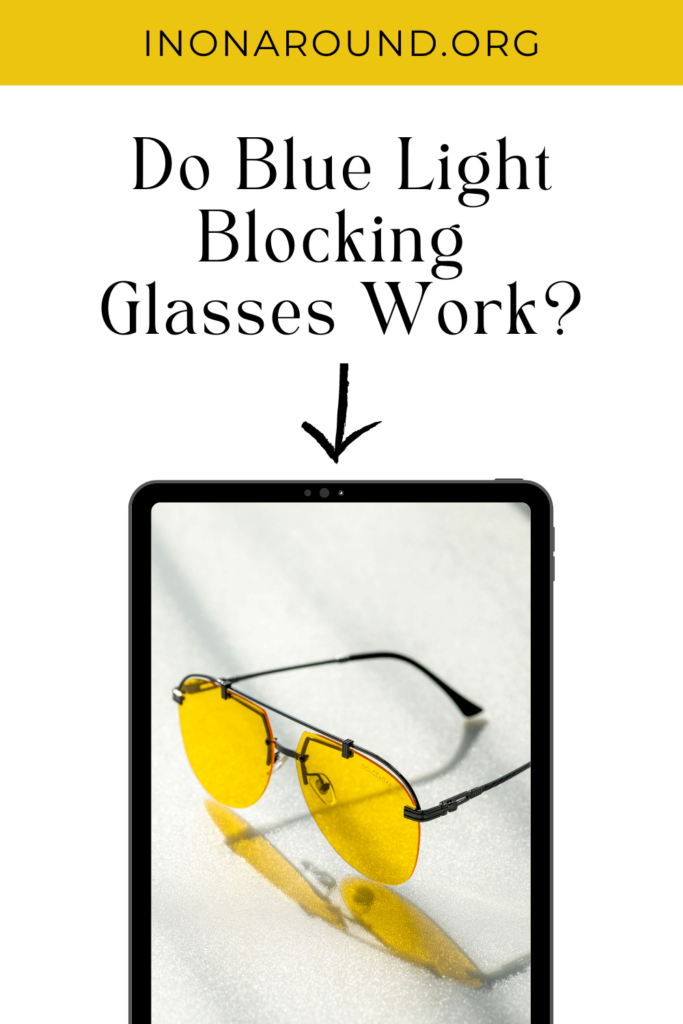
Frequently Asked Questions – Blue Light
Click on the below FAQs to learn more about the blue light glasses test, blue light contacts, benefits of blue light glasses, blue light headache, and more.
How Much Do Blue Light Glasses Cost?
Should You Try Blue Light Blocking Glasses?
Can Kids Wear Blue Light Glasses?
Does Blue Light Impact Sleep?
Did You Know These Blue Light Glasses Benefits?
Let me know your thoughts and key takeaways in the comments below!
You can watch our web story here.
xoxo,

Want to read more? Check out my other articles here!
Other references on Blue Light Glasses Benefits: Spektrum, Marvel Optics, Vantage Fit, EVOICL, Gunnar, PEL Eyewear, Rise Science, Sleep Foundation, For Eyes, Axon Optics, GoodRx Health, Mayo Clinic, Good Housekeeping, NY Times, Medical News Today, Cleveland Clinic, Everyday Health, River Heights Eye Care, Sleepopolis, Dr. Hyman, Bulletproof, THL, Bon Charge, Harvard
Copyright In On Around LLC 2023 ©. The statements made on this website have not been evaluated by the FDA (U.S. Food & Drug Administration). They are not intended to diagnose, treat, cure, or prevent any disease. The information provided by this website should not be used as individual medical advice and you should always consult your doctor for individual recommendations and treatment. The information contained in this site is provided on an “as is” basis. Related to this site, there are no guarantees of completeness, accuracy, usefulness, or timeliness. In On Around LLC assumes no responsibility or liability for any errors or omissions in the content of this site.

